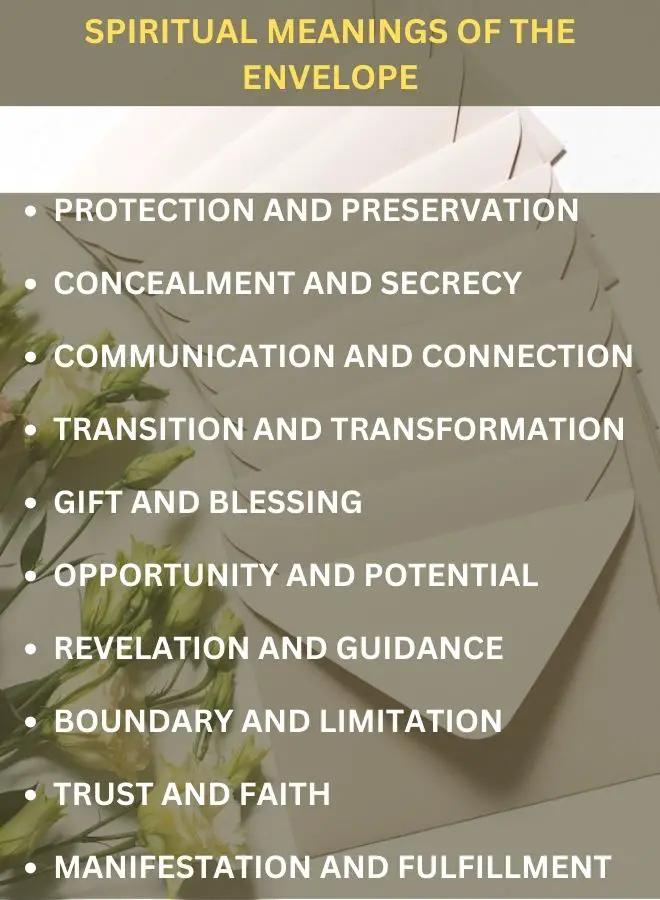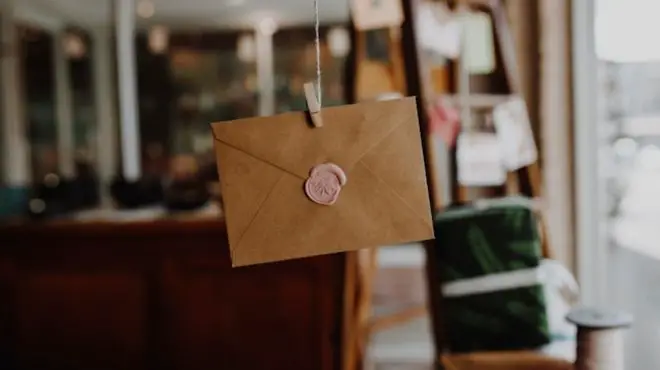Envelopes embody spiritual protection, communication, and revelation, serving as conduits for divine guidance, blessings, and the manifestation of potential.
Have you ever stopped to ponder the spiritual significance of something as mundane as an envelope? In our daily rush, we often overlook the deeper meanings hidden within everyday objects. But delve a little deeper, and you’ll discover that even the simplest of things can hold profound spiritual symbolism.
Spiritual Meanings of the Envelope

1. Protection and Preservation
An envelope acts as a shield, safeguarding its contents from external harm. In spiritual terms, it symbolizes the protective embrace of higher powers, offering sanctuary and preservation to that which is sacred.
2. Concealment and Secrecy
When sealed shut, an envelope conceals its contents, shrouding them in mystery and secrecy. This symbolism mirrors the hidden truths and esoteric knowledge that lie beyond the surface of our everyday existence, waiting to be unveiled by those who seek enlightenment.
3. Communication and Connection
Envelopes serve as messengers, bridging the gap between sender and recipient. In a spiritual context, they represent the channels through which divine messages are transmitted, fostering communication and deepening our connection with the spiritual realm and with one another.
4. Transition and Transformation
The act of opening an envelope marks a transition from one state to another, from anticipation to revelation. This process mirrors the journey of transformation inherent in spiritual growth, as we evolve from ignorance to enlightenment, from darkness to light.
5. Gift and Blessing
Envelopes often accompany gifts or tokens of affection, imbuing them with an added layer of significance. In a spiritual sense, they symbolize the blessings bestowed upon us by the universe, reminding us to cherish and appreciate the abundance that surrounds us.
6. Opportunity and Potential
Each sealed envelope contains the potential for something new and unknown, waiting to be discovered upon opening. Similarly, in the spiritual realm, envelopes represent the infinite possibilities that await us, encouraging us to embrace life’s opportunities with open arms and an open heart.
7. Revelation and Guidance
Envelopes can contain messages of wisdom, guidance, or revelation, offering clarity and insight into life’s mysteries. From a spiritual perspective, they serve as conduits for divine wisdom, illuminating our path and guiding us toward greater understanding and enlightenment.
8. Boundary and Limitation
Envelopes create a boundary between sender and recipient, separating one realm from another. In the spiritual realm, they symbolize the limitations of our physical existence, reminding us to transcend the boundaries of the material world and explore the boundless expanse of the soul.
9. Trust and Faith
When we seal an envelope and entrust it to the care of another, we demonstrate our faith and trust in their integrity. Similarly, in the spiritual realm, envelopes symbolize the trust we place in the universe, surrendering ourselves to the divine plan and allowing faith to guide our journey.
10. Manifestation and Fulfillment
Opening an envelope brings the contents into manifestation, transforming possibility into reality. In a spiritual context, envelopes symbolize the power of manifestation, reminding us that our thoughts and intentions have the power to shape our reality and bring our dreams to fruition.
Variations and Spiritual Meanings of the Envelope
1. Plain vs. Decorated Envelopes
Plain Envelopes: These minimalist envelopes symbolize simplicity and humility in the spiritual realm. They remind us that true beauty lies not in outward adornment, but in the purity of the soul.
Decorated Envelopes: Envelopes adorned with intricate designs or embellishments represent the richness and diversity of spiritual experiences. Each embellishment holds its own symbolism, adding depth and meaning to the envelope as a whole.
2. Sealed vs. Open Envelopes
Sealed Envelopes: Sealed envelopes signify closure and protection. They represent the need to safeguard our innermost thoughts and feelings, keeping them safe from external influences until the time is right for their revelation.
Open Envelopes: An open envelope symbolizes vulnerability and openness. It suggests a willingness to expose oneself to the world, to share one’s innermost truths and experiences without fear or reservation.
3. Addressed vs. Unaddressed Envelopes
Addressed Envelopes: Envelopes with a recipient’s address signify connection and communication. They represent the bonds that unite us with others, reminding us of the importance of reaching out and staying connected with those we care about.
Unaddressed Envelopes: On the other hand, unaddressed envelopes carry an air of mystery and possibility. They symbolize the unknown and the potential for new connections to be forged, leaving the door open for unexpected blessings and encounters.
4. Envelopes with Stamps vs. Without Stamps
Envelopes with Stamps: Envelopes adorned with stamps symbolize movement and progress. They represent the journey of the soul, as it travels through time and space, gathering wisdom and experience along the way.
Envelopes Without Stamps: Envelopes without stamps suggest a sense of stagnation or inertia. They serve as a reminder to take action and move forward in our spiritual journey, rather than remaining stagnant or complacent.
5. Envelopes with Personalized Messages vs. Blank Envelopes
Envelopes with Personalized Messages: Envelopes containing personalized messages hold deep significance, as they convey the sender’s thoughts, emotions, and intentions. They symbolize the power of words to uplift, inspire, and connect us with the divine.
Blank Envelopes: Blank envelopes, on the other hand, offer a blank canvas for creative expression. They represent the limitless potential within each of us, waiting to be unleashed and actualized through our thoughts, words, and actions.
6. Envelopes with Fragile Contents vs. Durable Contents
Envelopes with Fragile Contents: Envelopes containing fragile items symbolize the delicate nature of life and the importance of handling our blessings with care. They remind us to cherish the precious gifts we’ve been given and to handle them with reverence and gratitude.
Envelopes with Durable Contents: Envelopes containing durable items represent resilience and strength. They remind us of our inherent ability to withstand life’s challenges and emerge stronger and more resilient than before.
7. Envelopes with Unique Designs vs. Standard Designs
Envelopes with Unique Designs: Envelopes with unique designs or customizations symbolize individuality and self-expression. They remind us that each of us is unique and special, with our own gifts, talents, and contributions to offer the world.
Standard Designs: Envelopes with standard designs represent conformity and tradition. While they may lack the flair of their custom counterparts, they serve as a reminder of the importance of honoring our roots and respecting the wisdom of those who came before us.
8. Envelopes Received vs. Given
Envelopes Received: Envelopes received from others symbolize the abundance of blessings and opportunities that come our way. They remind us to remain open and receptive to the gifts of the universe, accepting them with gratitude and grace.
Envelopes Given: Envelopes given to others represent generosity and kindness. They symbolize our willingness to share our blessings with those in need, whether through material gifts, words of encouragement, or acts of service.
9. Envelopes Containing Monetary Gifts vs. Non-Monetary Gifts
Envelopes Containing Monetary Gifts: Envelopes containing monetary gifts symbolize abundance and prosperity. They remind us of the importance of sharing our wealth and resources with others, knowing that the more we give, the more we receive in return.
Envelopes Containing Non-Monetary Gifts: Envelopes containing non-monetary gifts, such as handwritten notes or tokens of affection, hold a different kind of value. They symbolize the priceless nature of love, friendship, and connection, reminding us that the most meaningful gifts are often those that money can’t buy.
10. Envelopes Used for Official Correspondence vs. Personal Correspondence
Envelopes Used for Official Correspondence: Envelopes used for official correspondence symbolize duty and responsibility. They remind us of the importance of fulfilling our obligations and honoring our commitments, whether in our personal or professional lives.
Envelopes Used for Personal Correspondence: Envelopes used for personal correspondence represent intimacy and authenticity. They symbolize the bonds of friendship and love that connect us with others, reminding us of the importance of nurturing these relationships and cherishing the moments we share.
Biblical and Hindu Meanings of the Envelope
The envelope, though not explicitly mentioned in sacred texts, can be symbolically interpreted in both Biblical and Hindu contexts, reflecting profound spiritual concepts.

Biblical Perspectives
1. Parables and Symbolism
The Bible frequently employs parables and allegories using common objects to convey spiritual truths. While envelopes are not specifically mentioned, the themes of concealment and revelation resonate throughout biblical narratives.
For instance, Jesus often spoke in parables to convey deeper spiritual messages, suggesting that the significance of envelopes can be understood within the broader context of divine communication and revelation.
2. Sealed Scrolls and Prophecy
In the Book of Revelation, a scroll sealed with seven seals is presented, signifying the hidden mysteries of God’s plan for humanity. Each seal, when broken, reveals a portion of divine prophecy, highlighting the theme of revelation and the unfolding of God’s will.
This imagery aligns with the concept of envelopes as vessels of concealed knowledge, awaiting the moment of divine unveiling.
3. Protection and Provision
The biblical narrative of Moses being placed in a basket and set afloat on the river illustrates the concept of divine protection and provision.
Similarly, envelopes can symbolize the protective embrace of higher powers, shielding their contents from harm and ensuring their safe arrival at their intended destination.
Hinduism Perspectives
1. Symbolism in Rituals and Mythology
Hinduism is rich in symbolism, with everyday objects often imbued with spiritual significance.
While envelopes may not have a direct counterpart in Hindu mythology, the practice of offering prayers and offerings in sealed containers during religious ceremonies echoes the concept of concealing sacred offerings within envelopes as a mark of reverence and devotion.
2. Concealment and Revelation
The Hindu concept of “maya,” or illusion, emphasizes the veil of ignorance that obscures one’s true nature and the underlying unity of all existence. Envelopes can be seen as metaphorical veils, concealing the deeper truths of existence until the seeker is ready to unveil them through spiritual practice and self-realization.
3. Gift Giving and Blessings
In Hindu culture, the exchange of gifts is often accompanied by blessings and good wishes. Envelopes containing monetary gifts or tokens of appreciation are commonly exchanged during festivals and auspicious occasions, symbolizing the sharing of blessings and abundance within the community.
Cultural Significance of the Envelope
Envelopes hold a diverse array of cultural significances across various societies, reflecting unique customs, traditions, and social practices.
Western Cultures:
1. Tradition of Gift-Giving
In Western cultures, envelopes often accompany gifts during special occasions such as birthdays, weddings, and holidays. The act of enclosing a gift in an envelope symbolizes thoughtfulness and care, adding an element of surprise and anticipation to the exchange.
2. Formal Correspondence
Envelopes are essential for formal correspondence, such as sending invitations, letters, and business documents. The choice of envelope color, size, and style may convey specific meanings and reflect the sender’s intentions and level of formality.
3. Sealed Secrets
Sealed envelopes evoke a sense of mystery and confidentiality, often associated with confidential documents, legal papers, or personal letters. Breaking the seal implies a breach of privacy, highlighting the importance of trust and confidentiality in interpersonal relationships.
4. Monetary Gifts
Envelopes containing cash or checks are commonly exchanged as gifts for various occasions, such as weddings, graduations, or religious ceremonies. The enclosed monetary gift symbolizes prosperity, good fortune, and blessings for the recipient’s future endeavors.
Eastern Cultures:
1. Red Envelopes in Asian Traditions
In many Asian cultures, particularly Chinese, Japanese, and Korean, red envelopes (known as “hongbao” or “angpao”) are traditionally exchanged during the Lunar New Year, weddings, and other festive occasions. Red symbolizes good luck, prosperity, and warding off evil spirits, making red envelopes highly auspicious gifts.
2. Rituals and Ceremonies
Envelopes play a significant role in various cultural rituals and ceremonies, such as births, weddings, and funerals. They may contain monetary gifts, auspicious symbols, or blessings, symbolizing goodwill, support, and community solidarity during important life events.
3. Etiquette and Protocol
The proper handling of envelopes reflects cultural etiquette and social norms. For example, in Japanese culture, presenting and receiving envelopes with both hands demonstrates respect and humility. Similarly, addressing envelopes with appropriate titles and honorifics is crucial for maintaining social harmony and showing deference to elders and authority figures.
4. Symbolism in Art and Literature
Envelopes have been depicted symbolically in Eastern art and literature, representing themes of longing, communication, and the passage of time. Poets and artists often use envelopes as metaphors for unrequited love, distant connections, or the ephemeral nature of human existence.
Enhancing Spiritual Well-being Through the Envelope
The humble envelope, often overlooked in its simplicity, holds the potential to enrich our spiritual journey and deepen our connection to the divine. Here are several ways in which we can utilize envelopes to enhance our spiritual well-being:
1. Mindful Reflection
Take a moment to reflect on the symbolism of envelopes in your daily life. Consider the messages you send and receive, both physically and metaphorically. How do envelopes represent the concealed truths and revelations awaiting discovery within your soul?
2. Gratitude Practice
Use envelopes as tools for expressing gratitude. Write thank-you notes or letters of appreciation to loved ones, friends, or even strangers, and seal them in envelopes. The act of sending and receiving heartfelt messages fosters a sense of connection and abundance in your spiritual journey.
3. Intention Setting
Harness the power of intention by writing affirmations, goals, or aspirations on small pieces of paper and placing them inside envelopes. Seal these envelopes with the belief that your intentions are being sent out into the universe, manifesting positive outcomes and spiritual growth.
4. Acts of Kindness
Spread kindness and compassion by sending uplifting messages, inspirational quotes, or small tokens of appreciation in envelopes to those in need of encouragement. Your gestures of kindness have the potential to uplift spirits and brighten someone’s day, fostering a sense of interconnectedness and unity.
5. Symbolic Gestures
Incorporate envelopes into your spiritual practices and rituals as symbolic representations of letting go, receiving blessings, or setting intentions. Whether you use them in meditation, prayer, or ceremonial rituals, envelopes can serve as tangible reminders of your spiritual journey and aspirations.
Conclusion
In conclusion, envelopes may seem like ordinary objects, but their spiritual significance transcends the physical realm. From symbolizing protection and concealment to fostering communication and connection, envelopes offer a myriad of opportunities for spiritual growth and enrichment. By embracing mindful reflection, gratitude practices, intentional giving, and creative expression, we can harness the power of envelopes to deepen our spiritual connection, spread kindness, and cultivate a greater sense of abundance and interconnectedness in our lives.
So, let us continue to explore the spiritual essence of envelopes and allow them to guide us on our journey towards greater understanding, compassion, and enlightenment.







